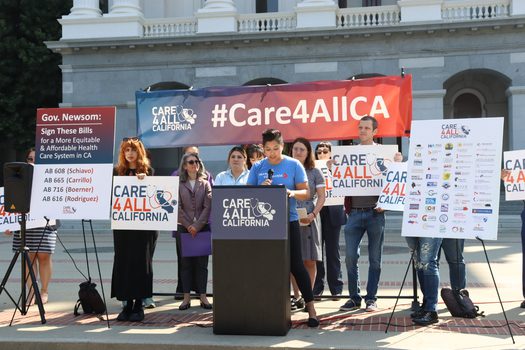By Suzanne Potter, Producer
Health care advocates are urging Gov. Gavin Newsom to sign four bills aiming to lower medical bills, improve transparency, and make health care more accessible.
Assembly Bill 665 would allow minors over age 12 to use Medi-Cal benefits for treatment they consent to on their own, while still allowing providers to involve a parent or guardian when appropriate.
Angela M. Vázquez, policy director for The Children’s Partnership, said teens may avoid getting help if they have to give intimate details to their parents.
“Surveys show that making parental opt-in mandatory reduces the likelihood that teens will seek timely treatment, especially among LGBTQ+, and youth of color,” Vázquez reported.
The bill would also allow Medi-Cal to cover services even if the youth is not a danger to him or herself or the victim of child abuse or incest. Opponents say the bill interferes with parental rights.
A second bill would stop surprise bills from out-of-network ambulance companies, instead requiring patients to pay only the in-network cost-sharing amount.
Danielle Miele, a mom from Citrus Heights, said after her teenage son tried to take his own life, the hospital transferred him via ambulance to a treatment center several hours away, resulting in a huge bill.
“Within a month we received an ambulance bill of over $9,000,” Miele recounted. “Adding insult to injury, literally. Why is this practice commonplace? Why is it even considered acceptable?”
Debt collectors have objected to a section of the bill dealing with wage garnishment.
A third bill would add physicians’ groups of 50 or more to the list of organizations required to make public financial data they report to two state agencies.
Sonia Pellerin, a health care worker in Sacramento and a member of the Service Employees International Union-United Healthcare Workers, said it is a matter of transparency.
“With health care costs rising, we all deserve to know where our health care dollars are going and what’s driving up the costs,” Pellerin contended. “Many times our patients are struggling to afford their health care. Those patients have the right to know how these medical groups are spending their money.”
Medical groups have called the bill an unnecessary layer of regulation. A fourth bill would extend Medi-Cal’s Comprehensive Perinatal Services Program from 60 days to 12 months postpartum. The program helps arrange housing and food assistance, job training, and breastfeeding support. Opponents cite budget concerns.







